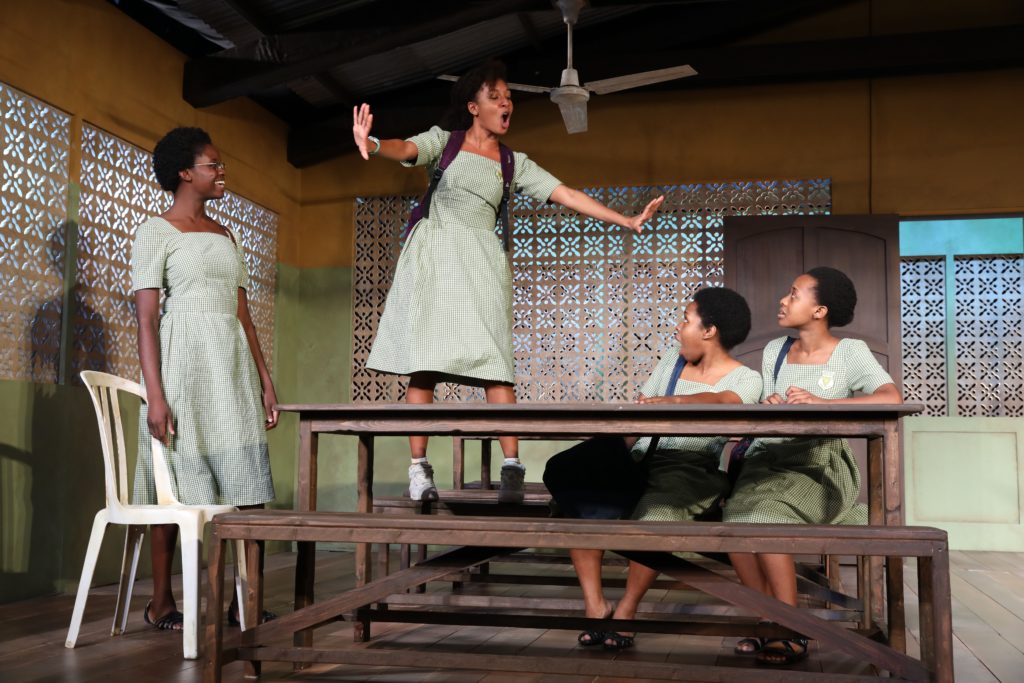Bioh’s comedy follows a group of teenage girls in their pursuit for beauty pageant fame. The playwright/actor-who grew up in New York City- is Ghanaian-American and wrote the piece after reading an article about controversial 2011 pageant that occurred in Ghana.
Bioh has had a productive year on the New York stage, having starred in two shows (Everybody, The Red Letter Plays: In the Blood) at Signature Theater. In addition to her new Off Broadway production, she’s hard at work developing more plays. .
Manhattan Digest recently spoke with her about the play and its’ themes.
MD: The play is based, in part, on your mother’s high school experience in Ghana. Did you interview her for this or just collect stories over the years?
JB: What I pulled from was that she was a girl of modest means and found herself in this prestigious boarding school in Ghana. She had to defend herself and develop a strong personality. I related to that because I was also in boarding school.
MD: How closely does it resemble your own boarding school experience at Milton Hershey in Pennsylvania?
JB: Not much. The plot came completely from my imagination but there are facets of some of the girls with whom I attended high school.
It really came together when I read this article about the 2011 Miss Ghana pageant. Pageant officials procured a girl who was clearly not Ghanian. She was bi-racial and from America.They claimed that her father was from a part of Ghana that–I promise you–no one ever leaves. They brought her to Ghana where she competed in the Miss Ghana pageant. They hoped that she’d place in the Miss Universe pageant and it backfired.
It was so clear that they thought they’d have a more competitive and viable contestant with someone who was more fair skinned. So that definitely was a case of colorism infiltrating into Ghana. I was fascinated by that entire story. I couldn’t believe that western standards of empirical beauty had somehow drifted into African society.

MD: Talk a little more about this theme of colorism. Is this a problem that has stemmed from within the African community or from American misperceptions?
JB: That’s an American thing…going way back to slavery. If you were fair skinned, you were somehow considered a better slave. Thus was born colorism within the black community. That has always and probably will always be an issue in American society. I think we’re all working hard to challenge standards of beauty within the community.
However, this is not something that was ever an issue in African countries, specifically in Ghana–a country that sits on top of the equator. By the laws of nature, the people are supposed to look dark because of their proximity to the sun. Somehow, the standards of what is beautiful and what is not started blending into the African culture.
MD: Was the incident in the Ghana beauty pageant an isolated situation or has it turned into an epidemic throughout Africa?
JB: Skin bleaching is a huge epidemic in many African countries. Ghana became the first country to outlaw skin bleaching creams, but that only happened in 2016. It’s not just in African countries. It’s in the Caribbean as well. People consider it fashionable in some way to have an unnaturally lighter complexion. Rarely does it look good . It leads to permanent damage that can’t be reversed. So, it’s definitely an epidemic.
What’s great about this show is the conversations that are sparked afterward from so many ethnicities. Once we can move past these oppressive standards that have been imposed by people we don’t know or care about, we can accept ourselves and each other.
MD: In terms of beauty, there is a double-edged sword with sexuality, particularly for minority women. If they are not portrayed as sensual or alluring, they can be overlooked or de-sexualized. On the other hand, if they are viewed in a sexual light, there exists the criticism of objectification or fetishization. How do you reconcile that notion?
JB: The first important thing is acknowledging that these crazy ideologies exist. If it isn’t the way you see the world, you need to understand that is a system that is in place and many people do see it like that. I don’t know that I have a solution other than discussing it and tackling it head on.

MD: Let’s look at beauty pageants, which were one of the sources of inspiration for School Girls. Do you think that they honor women, degrade them–or do something in between?
JB: I always found them entertaining to watch when I was younger, in spite of the fact that they are problematic in so many ways. I just wonder if they ever get to the heart of something important. If they were focused on educating people about the countries from which these women are representing, I think they could be great. But because they are so focused on physical appearance, I don’t know how useful they are.
MD: What do you hope will be the take away from School Girls?
JB: There is a quote that I read when I was in graduate school studying playwrighting that has stuck with me: “Comedy is just a funny way of being serious.” In that sense, I hope that people are educated. enlightened, and moved. If one of those things happen, that’s great. If all of them happens, it will be amazing.
School Girls; Or, the African Mean Girls Play runs now through December 31st at the Lucille Lortel Theater (121 Christopher Street NYC). For tickets and information, visit MCC Theater.
